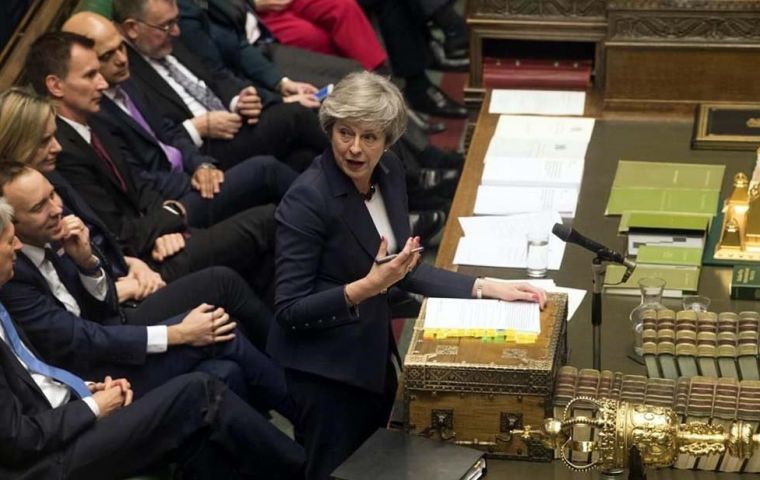MercoPress. South Atlantic News Agency
Second defeat of May's Brexit deal in Commons vote: several Tories crossed lines
 The setback for the PM came as MPs started five days of debate on the withdrawal agreement with the EU, and the framework for future relations
The setback for the PM came as MPs started five days of debate on the withdrawal agreement with the EU, and the framework for future relations  Former attorney general Dominic Grieve, the Conservative MP who led the rebellion, said he was acting out of a sense of a “deepening crisis” over Brexit.
Former attorney general Dominic Grieve, the Conservative MP who led the rebellion, said he was acting out of a sense of a “deepening crisis” over Brexit. Rebel Conservative MPs joined forces on Wednesday with Labour to inflict a fresh blow on Theresa May's government in a Commons Brexit vote. It means the government will have to come up with revised plans within three days if Mrs May's EU withdrawal deal is rejected by MPs next week.
It could also open the door to alternatives, such as a referendum. No 10 said Mrs May's deal was in the national interest but if MPs disagreed, the government would “respond quickly”.
The setback for the PM came as MPs started five days of debate on the withdrawal agreement with the EU, and the framework for future relations, ahead of the meaningful vote next Tuesday.
The government was expecting to have 21 days to come up with a “plan B” for Brexit if, as widely expected, Mrs May's deal is voted down. But MPs backed calls for it to respond within three working Parliamentary days, a deadline likely to fall on Monday 21 January.
Theresa May lost by 11 votes, with 297 MPs siding with the government and 308 against.
Among those voting against were 17 Conservatives, including former ministers Justine Greening, Sam Gyimah and Jo Johnson who want to see another referendum to decide whether the UK should leave or not.
Former attorney general Dominic Grieve, the Conservative MP who led the rebellion, said he was acting out of a sense of a “deepening crisis” over Brexit.
He told the BBC there had been too much “can-kicking” by the government and if the PM lost next week's vote, she would need to have “serious dialogue” with MPs about alternative options.
He said there was no need for the prime minister to go to Brussels to try and improve the deal. “I would rather hope that the government has been focusing on alternatives as it has been pretty clear for three to four months that the PM's deal is in trouble,” he added.
Fellow rebel Sarah Wollaston said she and other MPs opposed to a no-deal exit were engaged in a “guerrilla campaign” to show that it would never get the consent of Parliament.
But Conservative Brexiteer Jacob Rees-Mogg, who favours leaving without a withdrawal agreement, said it would not stop the UK exiting on 29 March.
“It merely requires a motion to be tabled not even debated,” he said.
And prisons minister Rory Stewart, who backs the PM's deal, said requiring Mrs May to restart complex negotiations with the EU and come back with changes in three days, was “unreasonable”.
He said Mr Grieve was “trying to provide more support for what he wants, which is a second referendum”.




Top Comments
Disclaimer & comment rulesCommenting for this story is now closed.
If you have a Facebook account, become a fan and comment on our Facebook Page!